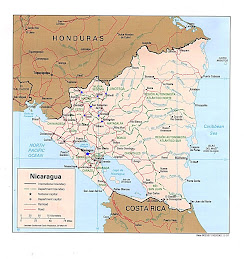Thursday, July 30, 2009
The End
Thursday, July 16, 2009
Sabana Grande, Round 2
Friday, July 10, 2009
Current Events
Tuesday, July 7, 2009
We're not actually leaving
Sunday, July 5, 2009
We're leaving
This weekend we went to Leon. The city is nicer than Granada, I think, because it’s less crowded. I don’t feel like writing much here right now, so I’m going to be brief. We met the Sabana Grande crowd, including two new volunteers, David from Texas and Jarrel (sic) from California. We went to the beach, and it was wonderful. In my limited beach experience, I have only really been to North Carolina’s Outer Banks, and New Jersey’s Cape May. Both of these locations yielded shores lined with sharp rocks, violent waves, and the coldest, most un-enjoyable waters that I’ve ever experienced. In addition, they were both a tad dirty (strewn with people’s garbage) and crowded. The beach in Leon was none of these things, and has finally shown me what a beach should be like. We accessed the beach by going through a bar situated not 50 feet from the tide line. In each direction, as far as the eye could see, the beach was lined with bars, hostels, and little bungalows with palm-thatched roofs and rows of hammocks occupied by napping patrons. The beach itself is of black sand, which extends at least 100 feet out into the surf, making the sea bed incredibly soft on the feet. On our stretch of the beach, there was an outcrop of rocks that extended a good 200 feet into the ocean, on which the incoming waves would crash and break before coming ashore. On one side, this created a calm section of beach, with little to no waves, and on the other side waves tall enough for the numerous surfers to successfully ride all the way onto the beach. The best part of all, was that the water was so warm that you didn’t even need to get used to it, and clear enough that you could see your hands a few feet beneath the surface. We spent a few hours here, attempting to body surf the larger waves, and throwing ourselves against the smaller ones. In addition, Dan and I climbed out to the edge of the rock outcrop, and watched the thousands of little rock crabs that inhabited the place dance about and get hammered by the waves. If there is any place in Nicaragua that I would be fully content to live, it would be on the coast at Leon. In fact, I can only imagine that it’s a hidden gem as far as beaches are concerned, because no-one really thinks of Nicaragua when they think of vacation spots. I’ll have to keep it in mind for the far future.
autonomic, because the government gave up on trying to control it.
Friday, July 3, 2009
Assorted
Wednesday, July 1, 2009
The move
Our new place is the home of Dona Claudia, and it is by our standards amazing. In the front of the house, Dona Claudia runs a Pasteleria (cake shop), and from what I have seen, her work is most impressive. In addition to cakes, she bakes all kinds of different pastries, which we have been lucky enough to have at breakfast the past few days. I told her that she has to teach me, sometime when I'm not at work, and she agreed.
We now have our own room, with a locking door, a tile floor, an air conditioning unit (which we have decided not to use, out of respect for their desire to save energy), our own separate bathroom, and permission to use our fan whenever, and for however long we like!
By far, the best part about Dona Claudia's is the fact that there, we feel welcome. Behind the cake shop, the rest of the house is partitioned into multiple rooms, which Dona Claudia runs like a boarding house for university students. Here, we are only two among around 10 other students, some of whom speak English, and almost all of whom are eager to talk to us, or at least help us by correcting our Spanish. Most of the students that we have met are girls (the guys seem to be a bit more hesitant to interact), but one hombre, Edwin, speaks nearly fluent English, is working on a degree in Civil Engineering, and has been most helpful in facilitating my practicing of the Spanish language. Yesterday, he decided that he would no longer speak English with me, unless I first attempted to say it, or understand it in Spanish. A painful idea for me, but a good one nonetheless.
